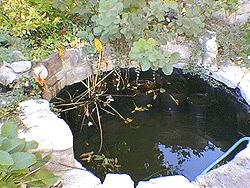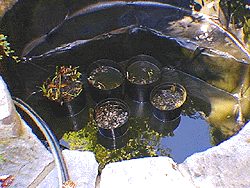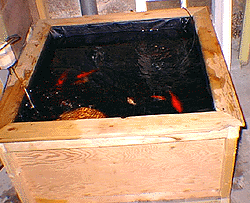Unlike giving advice on spring cleaning and other seasonal start-up tasks, giving advice regarding winterizing your pond, can be a difficult task even for Canadian readers, let alone for the rest of the world. Of critical importance for you in gleaning reliable information from this article is knowing your average minimum winter temperature, and how long you are likely to sustain such temperatures.
|
 |
Concrete ponds are problematic in areas with sustained periods of cold weather. Built correctly, they will most probably winter fairly well. There are, however, very few problems with liner ponds. We do take the precaution of lowering the water level by 10%, so the expanding ice will not damage any of the surrounding stonework, which is cemented together and therefore rigid.
|
 |
|
Since we never really know how severe the winter will be, we always turn off the underwater pump and drain the feeder lines by blowing air through them. Check the storage conditions required for your pump: some cannot dry out and must be stored in water; some can be cleaned and dried and put on a shelf for the winter. Ours does winter duty in our basement pond, but could be dried out if required.
We are careful, however, to cut off the summer growth on our water plants, and use netting and fairly constant skimming to keep leaves out of the pond. Vegetable matter rots, and robs the oxygen from the pond water. Even if you are not going to overwinter fish, keep your pond clean. The smell next spring alone is worth the effort! Believe me! A bit of precaution in the fall can help you avoid a very unpleasant spring cleaning experience.
|
 |
|
Winterizing your pond if you only have water plants is relatively easy. If your water plants are hardy in your area, and your pond is sufficiently deep (recommended depth in your area for concrete foundations), then you simply move the plants to the deepest part of the pond. If the hardy plants you have are marginals (normally found at the water's edge), then their roots/tubers are used to freezing, and you will have no problems, no matter the depth of your pond.
Our pond is deep enough to not freeze completely (unless the winter is much colder than usual for a sustained period of time - like two winters ago!) As a precaution, we move all water plants to the deepest part. And since we have only hardy plants, we have never had any problems no matter the severity of the winter.
If you have water plants which are not hardy to your area, you must bring them in to a nonfreezing but still cool area. Unless you can provide them with a lot of light (natural plus artificial or cool greenhouse, in the Ottawa, Canada area), keep them in a dark place and allow them to go dormant but not dry out completely. If you are not sure, and cannot get the information from the place of purchase, I would err on the side of caution. Be careful, too, with your growers' advice. I know that water plant growers a few hundred kilometers south of the Ottawa area claim that they have water lilies tested for hardiness - but the reality is Ottawa is fully two climatic zones colder. I tend to smile.
As with hardy terrestrial perennials, a constant fluctuation between freezing and thawing causes more damage than sustained freezing. I know of water gardeners (with
|
|

shallow ponds) in the Ottawa area who go to the bother of adding insulation (usually rigid styrofoam), boards to keep out snow, etc. It appears to work, but we
|
|
have little personal experience with it. It does slow down the spring melt. And given how our current pond is constructed (a raised wall along the back half), it would be difficult to install any kind of cover, insulating or not.
|
Third, you can at the same time of course easily move the pots from their winter location at the bottom of the pond to the shelf level, if required, and add fertilizer tabs. Summer is busy for us, so we prefer the "all season" variety, as opposed to the monthly ones. Both are simple to use, but follow the directions in regards to depth - feeding the algae is counter-productive! |
 |
|
Here is the big question, full of controversy and opinion. And to my mind best reflective of my opening cautions on using information in this article. Winters are not the same, even in the same zone. And while plants are forgiving, fish are not.
In theory, if you can guarantee that the bottom water in your pond will NEVER freeze solid, and if you can provide an oxygen source to the water (either with a pump; or keep a portion of the water surface open for oxygen exchange, manually or with a heating element ) you can over winter fish outside. The colder the water gets, the less active fish become, and the less food and oxygen requirements they have. If you have a large farm pond, just sit back and put another log on the fire. Hardy fish have been surviving Canadian winters longer than we have. A large body of water has enough oxygen and food in storage to sustain the fish, if not overstocked. If you have a small pond, even a deep one such as ours, guaranteeing the water will not freeze to the bottom, is a problem. If you are really lucky, there will be a water gardener in your neighborhood who has solved the "winter-problem" for your specific area. |
 |
Koi, by most advice I have come across, are less hardy than regular gold fish. I suspect this is not necessarily true. However, the koi are being bred for their looks predominantly, and I doubt if all breeders concern themselves with retaining the hardiness natural to the species. What is probably true is that some koi are as hardy as regular goldfish, and some are not. Those bred for large outdoor ponds in cold climates probably are.
As for us? Well, I found that I cannot emotionally attach myself to fish as I can with our other pets - but I never got over that spring the fish froze into blocks of ice like unwelcome sushi. We built a 36" x 36" x 24" wood and liner pond in our unfinished uninsulated basement. The cement floor by the walls gets very cold, but never falls below freezing. Our fish are moved inside in mid to late October along with the pump and any floating water plants we may have. We hang a single plant light over the pond, on a timer set for 12 hour days, and feed them well throughout the winter. They're so happy, they reproduce! (Although they are even happier to get back outside in the spring).
|
|
